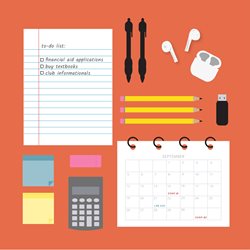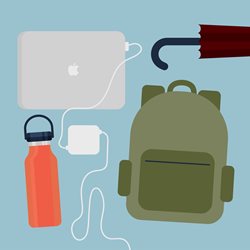By Sydnie Harrell, Office of Undergraduate Studies at Texas A&M University
With Howdy Week in full gear, the start of the fall semester is swiftly approaching. The first week of classes can bring excitement, joy, and eagerness, but it tends to also be associated with feelings of nervousness, stress, and unpreparedness. Check out these 10 tips to ensure you come out of syllabus week ready to take on the rest of the semester.
#1 Run through a mock first day
.jpeg)
Have you ever had the recurrent (and unpleasant) dream that you’re running late? Well, you can easily prevent this in real life when it comes to your first week by physically finding your classes before school starts. You can also look for study spots, figure out if you’re going to walk, bike, ride a Veo scooter (see tip #9) or take the bus, and learn where you can park. Doing these things can help you assess how long it will take to get to class and how early you should leave home.
#2 Get familiar with campus resources

Texas A&M University offers an abundance of resources to help students succeed in all areas of college life. Whether you need help academically or on a personal level, there is likely a resource to help you. Plus, knowing the campus resources before you need help can cut down on your stress levels and improve your chances of success. Download this short list of campus resources as a starting point; use the bottom half of the sheet to customize the list to your needs. Additionally, save this number to your contacts: University Police - 979-845-2345.
#3 Introduce yourself to instructor(s) and classmates

After the first or second class, you should introduce yourself to your professor, instructor, and/or teaching assistant. Ask them things like what name they want to be called, their preferred method of communication, and advice on succeeding in their class. Developing a positive relationship early will not only improve your learning and motivation, but it also might help down the road if things get tough. Don’t forget to talk to your classmates too; class friends can help build your community, and you can share resources, have an outlet when times are stressful, and form study groups. The ASC has a handout with tips on how to form a study group.
#4 Keep in touch with your advisor

As you attend classes, you might decide to change your class schedule during the first week. Students can make changes during the first five class days of the fall and spring semesters; however, you should check with your academic advisor before you edit your schedule. Dropping or adding classes might impact your time to degree or future course options. For some students receiving federal aid, choosing the wrong course might impact how much financial aid they will receive. Check with your academic advisor before you make any changes. Keep your advisor’s email handy, and use the Navigate Student app to find their drop-in or appointment times.
#5 Start the semester organized

During the first week, you will receive syllabi for your classes; these include the due dates to every assignment that you will have throughout the semester; put all these assignments into a calendar or planner. Additionally, you will want to mark deadlines for club sign-ups, meetings, scholarship applications, and financial aid applications (and disbursements). To help you stay organized and keep track of due dates, the ASC has a free academic success planner available online, or you can purchase a hard copy in the MSC bookstore. In addition to the standard monthly calendars, this planner includes study and learning tips, weekly and hourly planners, and a syllabus summary.
#6 Use StudyHub.tamu.edu

Studying in college classes starts from week one; the rule of thumb is to spend three hours studying outside of class for every hour spent in class. StudyHub.tamu.edu is essentially a one-stop-shop for finding all the different departments and units that offer academic help, like tutoring, peer mentoring, help sessions, and more. By searching for help based on subject area, the type of support you want, or by location, you can find learning resources tailored to your academic needs. On top of that, the site also has links to the ASC Study & Learning Handouts (accessible online 24/7).
#7 Commit to a weekly routine

With this semester being the first completely in-person semester for some students (and the first overall for freshmen), and since there is an ongoing pandemic, it’s important to keep your mental health in mind from day one. You can do this by establishing a routine that ensures that you will get enough sleep, attend class, have time to study, and have time for leisure activities (like exercising and socializing). By committing to a routine early on, you will train your brain to stay focused and organized, decrease distress levels, and create healthy habits that will help your first week (and entire semester) go smoothly.
#8 Keep these essentials in your backpack

As always, make sure you have your laptop with you; some professors will expect you to access online course materials during syllabus week. Along with that, make sure you have a laptop charger and a phone charger so you don’t have to worry about your devices dying. Some other essentials that are beneficial to pack include a reusable water bottle, an umbrella (because it will rain when you least expect it), and a snack. Also, be sure to have a picture of your schedule on your phone in case you can’t access Howdy.
#9 Download these apps

Make your first week easier by already having these apps downloaded:
- Duo Mobile – This authentication app is required to log in to Howdy.
- Navigate – This app is used to schedule appointments, find study-buddies, and more (see: Navigating Navigate: A Student Perspective).
- TAMU Spirit – This app shows leave/arrival times and routes of the Aggie Spirit Bus (PSA: The bus does not stop at every stop; to signal that you want to get off at the next stop, pull the cord or push the yellow tape).
- Veo – This app is used to find/pay for Veo bikes and scooters to ride. Be sure to set up your account now rather than later when you’re rushing to get to class on time (pro tip: sign up with your Texas A&M email for discounted rates).
#10 Stay up to date on Covid-19 news

Texas A&M continues to provide information about campus guidelines, testing sites, vaccination ability, and Covid-19 statistics on their COVID-19 Guidance page.
###
Media Contact: Anna Transue, transuea@tamu.edu